About
- Founder
- Montessori
- Philosophy
- References
- Contact
Founder
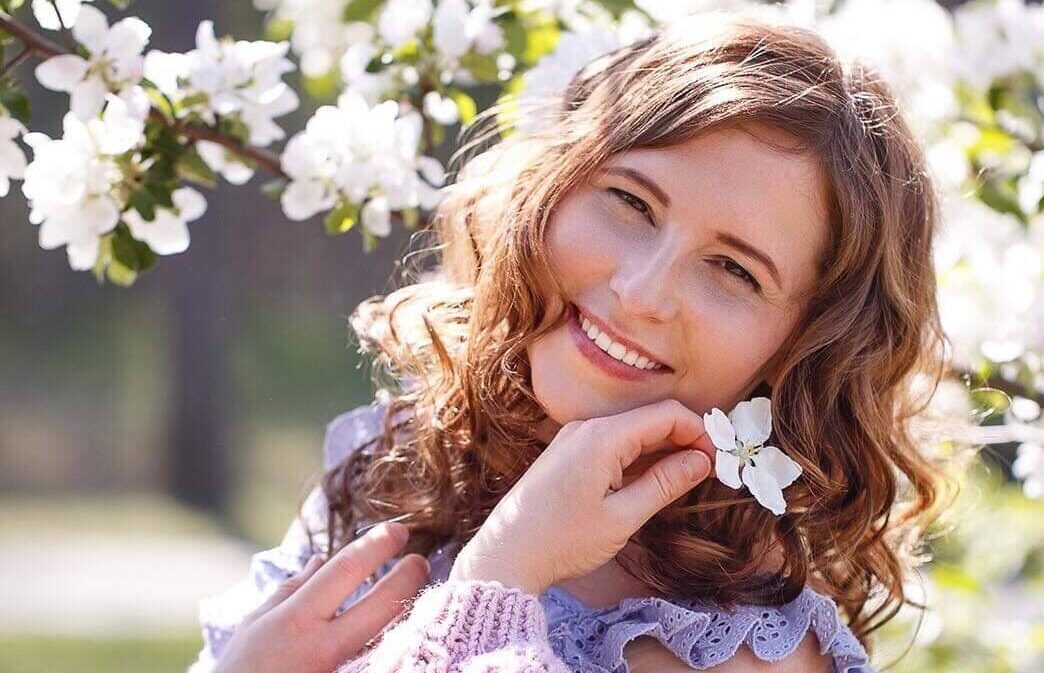
Margarita is Occupational therapist from Latvia.
She has been working as an Occupational Therapist with adults and children.
Margarita is certified AMI (Montessori) teacher for the 0-3 age group (trained by Patricia Wallner / Netherlands) and AMI Assistant 0-3 and 3-6
Margarita has long recognized the strong affinity between Occupational therapy and Montessori education.
Also she has experience as a Montessori mom of 3 children.
Like all mothers, she want her children’s unique strengths to be developed in a positive and empowering environment.
Montessori method has been shown to foster personal independence, high self-worth, deep thinking, concern for others, and a love for learning.
Margarita is an enthusiastic, friendly and open person.
Speaks in Russian, Latvian and English, understand Estonian language very well
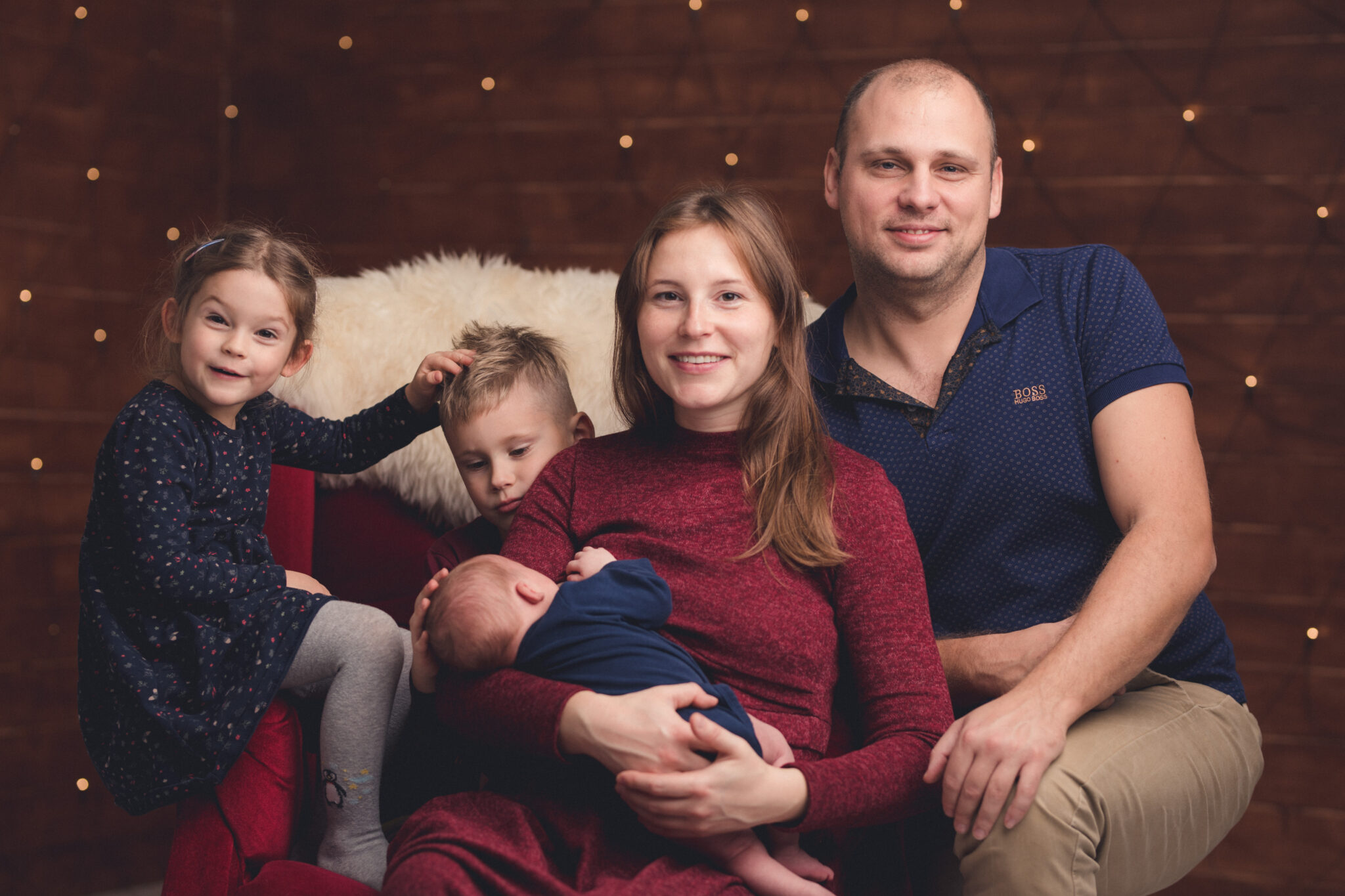
Montessori
“Education is a natural process carried out by the child and is not acquired by listening to words but by experiences in the environment."
Doctor Maria Montessori
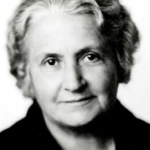
What is Montessori education?
The educational method of Doctor Maria Montessori, an Italian teacher and humanist (1870-1952), is based on self-directed activity and hands-on learning in a specially prepared environment. In Montessori classrooms children make creative choices in their learning, while the classroom and the teacher offer age-appropriate activities to guide the process. Children work in groups and individually to discover and explore knowledge of the world and to develop their maximum potential.
The basic difference of Montessori method from conventional education is an attitude to the child as to a unique individuality with a huge in-born potential – all children are born with 100 000 000 000 neurons in their brain ready to work!
Montessori classrooms are beautifully crafted environments designed to meet the needs of children in a specific age range. Every material in a Montessori classroom supports an aspect of child development, creating a match between the child’s natural interests and the available activities. Children can learn through their own experience and at their own pace. They can respond at any moment to the natural curiosities that exist in all humans and build a solid foundation for life-long learning.
The role of a teacher is to link the child with the activities in the environment, to give him an opportunity to go his own, unique way in order to realize his creative potential.
Montessori was deeply convinced that any child is a person, capable of opening his/her huge potential in an active work. This work aims mastering of the environment as well as the culture created by previous generations.
The phenomenon of Montessori method consists in its boundless belief in the nature of the child, in its tendency to exclude any authoritative pressure upon a forming person as well as to orientate to a free, independent, active person!
Children attending Montessori classes love to work, are attached to reality, obedient, not possessive, have skills of concentrating, exhibit independence and initiative, are self-disciplined and show great joy in learning.
The Association Montessori Internationale (AMI) was established by Maria Montessori in 1929 to protect the integrity of her work and to support high standards for both teacher training and schools. Today, AMI continues to uphold Maria Montessori’s vision while collaborating with contemporary research in neuroscience and child development.
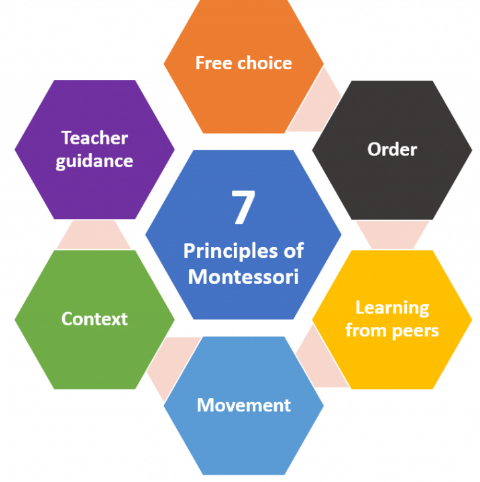
Frequently asked questions
Montessori (pronounced MON-tuh-SORE-ee) education was founded in 1907 by Dr. Maria Montessori, the first woman in Italy to become a physician. She based her educational methods on scientific observation of children’s learning processes. Guided by her discovery that children teach themselves, Dr. Montessori designed a “prepared environment” in which children could freely choose from a number of developmentally appropriate activities. Now, nearly a century after Maria Montessori’s first casa dei bambini (“children’s house”) in Rome, Montessori education is found all over the world, spanning ages from birth to adolescence.
Our Montessori class is opened for children 0-3 years old with their parents.
Innovative materials are designed and developed by team of educational specialists, aimed at supporting play and development. These materials are based on internationally proven curricula and learning goals, meaning that products are always of the highest quality and are geared towards the needs and wishes of Montessori participants.
At our Montessori center, all of our lead guides (our teachers are called “guides”) have earned Montessori certifications for their particular level. Courses for Montessori guides are provided by AMI (Association Montessori Internationale). Margarita Raaliste is Occupational therapist, has „AMI Montessori 3-6 assistants certificate“ and passed the course „Music for the development of intelligence”.
Children in Montessori classes learn at their own, individual pace and according to their own choice of activities from hundreds of possibilities. They are engaged in individual or group activities of their own, with materials that have been introduced to them. Learning is an exciting process of discovery, leading to concentration, motivation, self-discipline, and a love of learning.
Yes, you can use Montessori principles of child development at home. Look at your home through your child’s eyes. Children need a sense of belonging, and they get it by participating fully in the routines of everyday life. Our specialists can help you to implement Montessori principles at your home.
Montessori is designed to help all children reach their fullest potential at their own unique pace. A classroom whose children have varying abilities is a community in which everyone learns from one another and everyone contributes. Moreover, multiage grouping allows each child to find his or her own pace without feeling “ahead” or “behind” in relation to peers.
Research studies show that Montessori children are well prepared for later life academically, socially, and emotionally. In addition to scoring well on standardized tests, Montessori children are ranked above average on such criteria as following directions, turning in work on time, listening attentively, using basic skills, showing responsibility, asking provocative questions, showing enthusiasm for learning, and adapting to new situations.
Our classrooms are ‘real world’. In the ‘real world’ people work together to solve problems, resolve differences, make contributions to the larger community, follow their passions and make choices and learn from their mistakes.
No, Montessori center is independent of any religious affiliation.
For additional information please contact us
Philosophy
Mission
To provide parents with guides to modern parenting and inspire children to explore and learn in a harmonious environment.
Vision
- Development Center commit to create a caring and nurturing environment for the children where they can satisfy their developmental needs, grow and thrive.
- Center do their best to help the children to fulfill their creative potential.
- Informative, educational seminars, workshops, and lectures are organized for parents.
- At the center parents and children receive individual consultations from specialists in different fields.
References
Kramer, Rita. Maria Montessori: A Biography. Foreword by Anna Freud. Reading, MA: Perseus Books, 1976, 1988.
Miller, John P. ; Nakagawa ,Yoshiharu (Ed.) Nourishing the Spiritual Embryo:
The Educational Vision of Maria Montessori. Published in Nurturing Our Wholeness: Perspectives on Spirituality in Education, Edited by (Brandon, VT: Foundation for Educational Renewal, 2002)
Ministry of Education, 2007. The New Zealand Curriculum. Learning Media, Wellington.
Montessori, M. (ed. 1994). The Absorbent Mind. Clio Press Limited, p. 121
Montessori, M. (1964) The Montessori method. New York, Schocken Books, Inc.
Montessori, M. (1965) Dr. Montessori’s own handbook. New York, Schocken Books, Inc.
Montessori, M. (1967). The discovery of the child. New York, Fides Publisher Inc.
Montessori, M. (1966). The secret of childhood. New York, Fides Publishers, Inc.
Montessori, M. (1973). The Montessori Elementary Material: Volume 2 of the Advanced Montessori Method. New York, Schocken Books
Montessori, Mario, (1956). The human tendencies and Montessori education. Association Montessori Internationale (revised edition of a lecture originally delivered in 1956 under the title, “The Tendencies of Man”).
Povell, P. (2007). Maria Montessori: portrait of a young woman. Montessori Life: A Publication of the American Montessori Society, 19(1), 22-24.
Satterly, D. (1987). “Piaget and Education” in R L Gregory (ed.) The Oxford Companion to the Mind Oxford, Oxford University Press
Standing, E. (1998). Maria Montessori: Her life and work. New York: Penguin.
United Nations Convention on the Rights of the Child (NZ ratified in 1993)
Contact
We organising the Playgroup in private house – Udu tn 6-2, Laagri alevik (not far from Nõmme)
How to get here?
18, 18A, 27
We have a parking slots
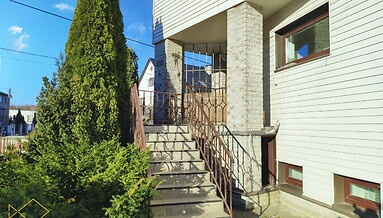
STAY IN TOUCH
Contact us
If you have any further questions, please do not hesitate to contact us
Monday 9:30 - 14:00
Tuesday 13:00 - 17:30
Wednesday 9:30 - 14:00
Thursday 13:00 - 17:30
Friday 11:00 - 14:00